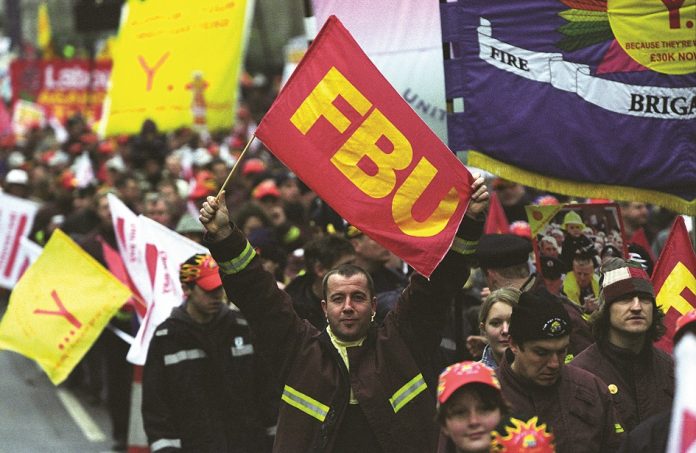Georgina Lewin, firefighter, North Birmingham Socialist Party
The outstanding Fire Brigades Union ballot result of firefighters across England, Scotland and Wales was published on the 30 January. Another group of workers to smash the anti-trade union threshold, with a 73% turnout and an 88% vote for strike action.
Fire and rescue is one of the most respected and dangerous professions. The World Health Organisation ranks firefighting as a ‘class one’ cancer-causing profession. During the Covid pandemic firefighters took on extra duties, including assisting paramedics. This was on top of existing duties, which include handling heavy and complex equipment for house fires, high-rise fires, car crashes, water resources, building collapses, animal rescue, trauma care, hazardous materials, body retrievals, lift rescues… the list goes on!
Firefighters train and dedicate their lives to the service. Many of my colleagues feel anger and frustration that their loyalty is not being recognised. 11,000 jobs have been lost in the Fire and Rescue Service over the last twelve years of austerity cuts. Attacks to our service don’t just affect firefighters on the front line, they affect all the public and the service they get from us, which can result in injury and death.
Inflation is going up but our pay isn’t matching this. Firefighters are using food banks, and can’t afford heating, water or basic bills, after a 48-hour week of working to protect the public from having what could be the worst day of their lives. Some of my colleagues can’t even afford the fuel to get into work. One worker told me this is a “stressful enough job as it is, without worrying about getting what we deserve”. The FBU has calculated firefighters have seen a real-terms pay cut of £4,000 per year since 2010.
But as technology and combustible materials become more complex and dangerous, our jobs will become even more demanding. Not to mention the growing climate response we will need to prepare for future generations. At a time where money should be invested into the service and its workers, we are seeing the opposite.
We work in one of the richest countries in the world, so for us to be told there isn’t enough money to pay public sector workers is a lie. The government of the 1% are so far removed from the rest of us that they don’t have to worry about their medical future or their safety. I’d like to see any of them do a day in the job of a firefighter!
It takes a special type of person to be a firefighter and their service should be treated with respect so the workers can live with dignity. The government needs to put money where their mouth is, and if they don’t we’ll boot them out.







